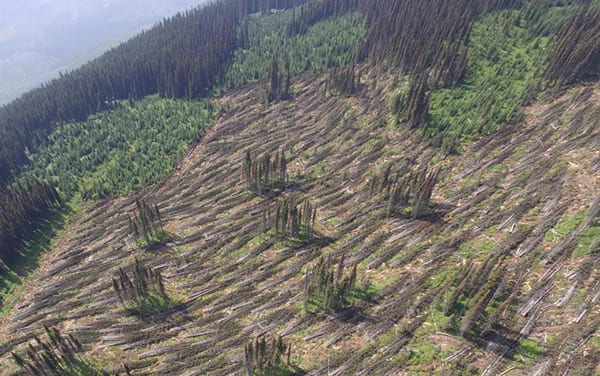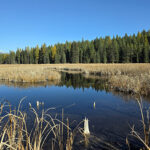Home »

Wildsight joins call for moratorium to preserve caribou
Wildsight, joining with other environmental groups in B.C., has called on the provincial government for an immediate moratorium on new development in mountain caribou critical habitat.
This comes after discovering that, since May, the B.C. government has approved 83 new logging cutblocks in critical habitat of B.C.’s eight most at-risk southern mountain caribou populations.

Nearly six months have passed since federal Environment and Climate Change Minister Catherine McKenna declared that southern mountain caribou are facing imminent threats to their recovery. Since then, B.C. has not taken significant on-the-ground action to stop the loss of our southern herds.
“The devastating losses of mountain caribou over the past year in the South Purcells and South Selkirks highlights the failure of British Columbia’s caribou recovery efforts. Despite the obvious urgency, nothing has changed on the ground for caribou,” said Eddie Petryshen, Conservation Coordinator for Wildsight.
Wildsight, along with Yellowstone to Yukon, Wilderness Committee, the Harmony Foundation, Greenpeace Canada and renowned naturalist and artist Robert Bateman, held a press conference in Victoria on Monday, demanding that B.C. establish an immediate moratorium on destructive activities until recovery plans are not just completed, but implemented on the ground.
“The B.C. government says they care about protecting caribou but their actions say they care more about filling the pockets of logging companies,” said Charlotte Dawe, Conservation and Policy Campaigner for the Wilderness Committee, which discovered the new cutblocks awarded by the province. “We’re calling the province out on their deficient plans that have resulted in the disappearance of two herds. Caribou need their critical habitat protected now.”
According the federal assessment that many mountain caribou populations face imminent threats to their recovery, mountain caribou depend on intact forests and logging and other industrial activity in their habitat remains one of the biggest threats to their recovery.
“With an increasing number of herds disappearing, Minister McKenna cannot afford to stand by while the B.C. government tinkers with an ineffectual ‘made in B.C.’ approach. The B.C. government must begin to collaborate in good faith to find solutions with Ottawa, First Nations and other stakeholders — or it must get out of the way,” said Eduardo Sousa, Senior Forest Campaigner for Greenpeace Canada.
“If B.C. continues to prioritize industry over caribou, the Minister McKenna has an obligation under the Species At Risk Act to issue an emergency protection order for southern mountain caribou herds in B.C.” added Petryshen, “which would see an immediate halt to destruction of critical caribou habitat. Why is B.C. waiting for the federal government to protect mountain caribou, when they control permits for logging and other destructions of critical caribou habitat?”
The Burnt Pine, South Purcell and South Selkirk herds are among the herds that have become functionally extirpated in recent years. The transboundary Selkirk herd made international headlines in April when it was reported that its number dwindled to three (and now, two).
In June, scientists criticized the province’s emerging caribou recovery plan (a discussion paper released by Doug Donaldson, B.C.’s Minister of Forests, Lands, Natural Resource operations and Rural Development) for ignoring scientific best practices, the role of logging in caribou decline, and even failing to comply with legal obligations under the Species at Risk Act.
These developments, in combination with the B.C. government’s continued failure to take the urgent action required, make the case for the federal government to undertake its duties under SARA and issue an emergency protection order. This order would empower the federal government to prohibit the destruction of specified critical habitat.
Caribou decline has significant impacts on First Nations’ rights. Caribou recovery is linked to upholding treaty rights; the right to hunt caribou is enshrined in Treaty 8 in northeast B.C. Industry-first caribou planning in B.C. is also interfering with First Nations’ efforts to step in and undertake effective recovery measures.
Lead image: Mountain Caribou habitat laid low in cutblock R316. Photo submitted
Wildsight







